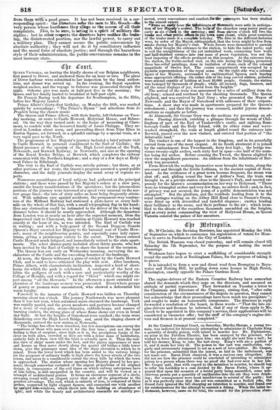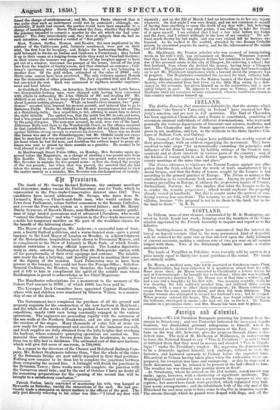t4r 3?iittrufulit
Mr. M'Christie, the Revising Barrister, has appointed Monday the 16th of September on which to commence his registration of voters for Mem- bers to serve in Parliament for the City of London.
The British Museum was closed yesterday, and will remain closed till Saturday the 7th September, for the purpose of making the usual cleansings.
Workmen havebegun to erect a scaffolding of considerable strength round the marble arch at Buckingham Palace, for the purpose of taking it to pieces.
It is intended to form a new and direct road from Brompton to Bays- water and Notting Hill, by pulling down some houses in High Street, Kensington, exactly opposite the Palace Gardens Road.
The engine-drivers of the Eastern Counties Railway have somewhat abated the demands which they urge on the directors, and assumed an attitude of partial repentance. They forwarded on Tuesday a letter to the Chairman and Directors of the Company, stating that, after calm consideration of the circumstances of the dispute in question, they cannot but acknowledge that their proceedings have been much too precipitate " ; and sought to make an honourable compromise. The directors in reply forwarded a resolution of the board, in these words—" That the late en- gine-drivers and firemen be informed, that if any of them apply to Mr. Gooch to be appointed in this company's service, their applications will be considered as vacancies offer ; but the staff of the company's engine-dri- vers and firemen is at present completed."
At the Central Criminal Court, on Saturday, Martha Sharpe, a young wo- man, was indicted for feloniously attempting to administer to Charlotte King a. quantity of deadly poison, with intent to murder her. Mr. Elphinstone, an actor at the Pavilion Theatre, has been annoyed by the prisoner, who wished to force her attentions upon him ; one night she sent him a tart ; he told his dresser, King, to take the tart away. King's wife ate a portion of it, and it made her very ill. The poison in the tart was canthandes, vul- garly and erroneously supposed to act as a sort of love-philter. Mr. Cooper, for the prisoner, submitted that the intent, as laid in the indictment, was not made out. Baron Platt observed, it was a curious case altogether. He did not see how the prisoner could be convicted of intending to administer poison to a person whom there was no proof she had ever seen in her life. Mr. Cooper said, that with regard to the intention to murder, he should beg to refer his Lordship to a case decided by Mr. Baron Parke, where it ap- peared that upon the occasion of a bridal party being assembled, some mis- chievous person put a quantity of canthandes into the ale they were drink- ing; the consequences were most mischievous to several of the party; but as it was perfectly clear that the act was committed as a foolish joke, the Grand Jury ignored the bill charging an intention to murder, and found one for misdemeanour for the attempt to commit a felony. When the latter in- dictment, however, came on for trial, the counsel for the prosecution Oran-
doned the charge of misdemeanour ; and Mr. Baron Parke observed that it was quite clear such an indictment could not be sustained ; although, un- doubtedly', if death had ensued, the parties would have been amenable to a charge of manslaughter. Baron Platt asked the Jury, whether they thought the prisoner intended to commit a murder by the act which she had com- mitted ? The Jury immediately said, they were of opinion that she had no such intention; and returned a verdict of " Not guilty."
Hort, 'Tonnes, Steffen, Homan, and Kessler, the men implicated in the robbery of the Californian gold, formerly mentioned, were put on their trial, the first four for burglary, and Kessler for harbouring Steffen. The gold belonged to Suetta an Italian and Cailleaux a Frenchman ; they locked it up in their rooms at a lodging-house while they went to Vauxhall Gardens; on their return the treasure was gone. Some of the burglars appear to have got out of a window, traversed the parapet of the house, forced off the iron bas from the window of Suetta'a room, and time obtained an entrance ; Call- Issue's apartment was probably entered by means of a key belongingto another door. Of the gold stolen, estimated at the value of 30001., only thirty-nine ounces have been recovered. The only evidence against Homan was the statements of other prisoners. The Jury acquitted him and Kessler, but convicted the rest. Each was sentenced to eighteen months' imprison- ment and hard labour.
At Guildhall Police Office, on Saturday, Robert Gibbins and Lewis Isaacs, two disreputable-looking men, were charged with having been concerned with others in defrauding Mr. John Ohlfield of 801. and stealing 101. Mr. Oldfteld is an artist; he has been abroad for twenty years, and know "going about London seeking pleasure." While on board a river steamer, two " gen- tlemen " accosted him, learned his present pursuit, and induced him to go to Battersea Fields. There Mr. Oldfield saw his new acquaintances bet and lose at a thirnblerig-table k they urged him to bet, offering to assist him to detect the right thimble. The upshot was, that the artist lost 301. in coin and notea, had a ten-pound note snatched from his hand, and was then suddenly deserted by the gang, ofrogues. The men new accused, he said, were two of the band. Alderman Kelly sent them to the Wandsworth Court, as the offence occurred in that jurisdiction. The Wandsworth Magistrate did not think the evidence against Gibbins strong enough to warrant his detention. There was no doubt that Isms was one of the thimbferiggers; but Mr. Oldfleld could not swear that he snatched the ten-pound note : the prosecutor had no less than 801. in his hand when he lost the note, and doubtless the robbers hoped to grasp all. Isaacs was sent to prison for three months as a gambler. He seemed to be well pleased to get off so easily.
At Marlborough Street Police Office, on Monday, Mrs. Sevester again ap- peared before the Magistrate, on a charge of stealing a ten-pound note from Mrs. Ruddle. This was the case where two ten-pound notes were given to Mrs. Sevester in mistake for five-pound notes : at first she denied the receipt of the ten pounds ; but when that was proved, she asserted that she had taken the money on account of rent. Mr. Ruddle having consented to view the matter merely as a mistake, Mrs. Sevester was discharged out of custody.



























 Previous page
Previous page